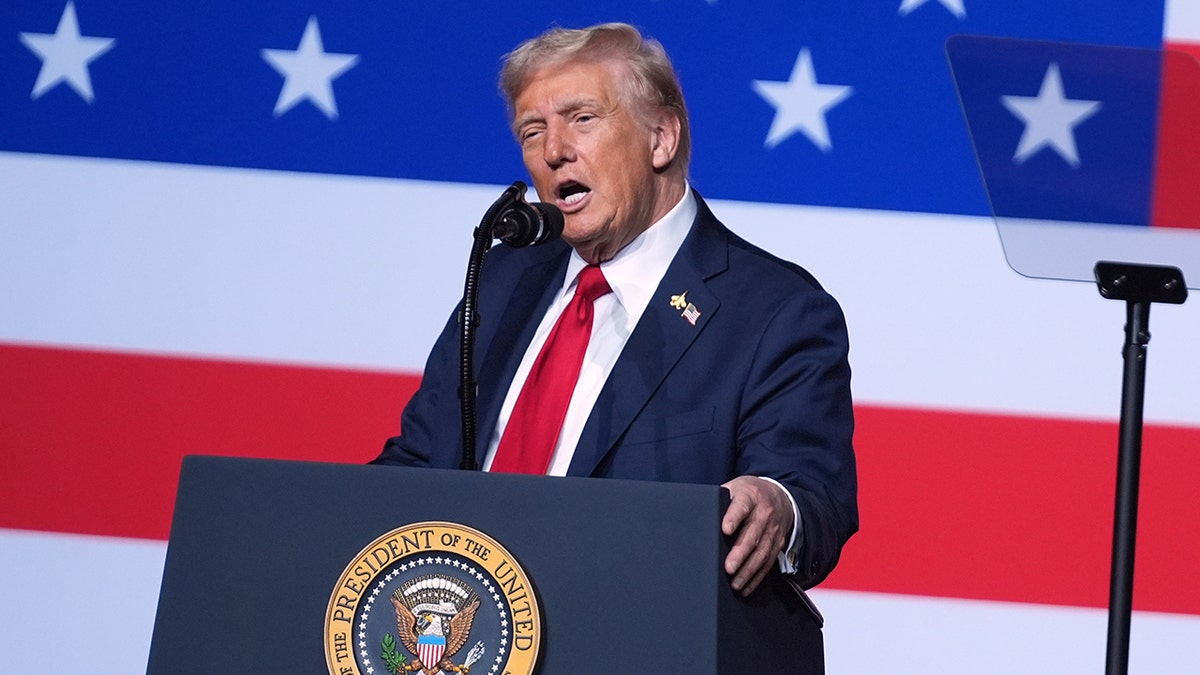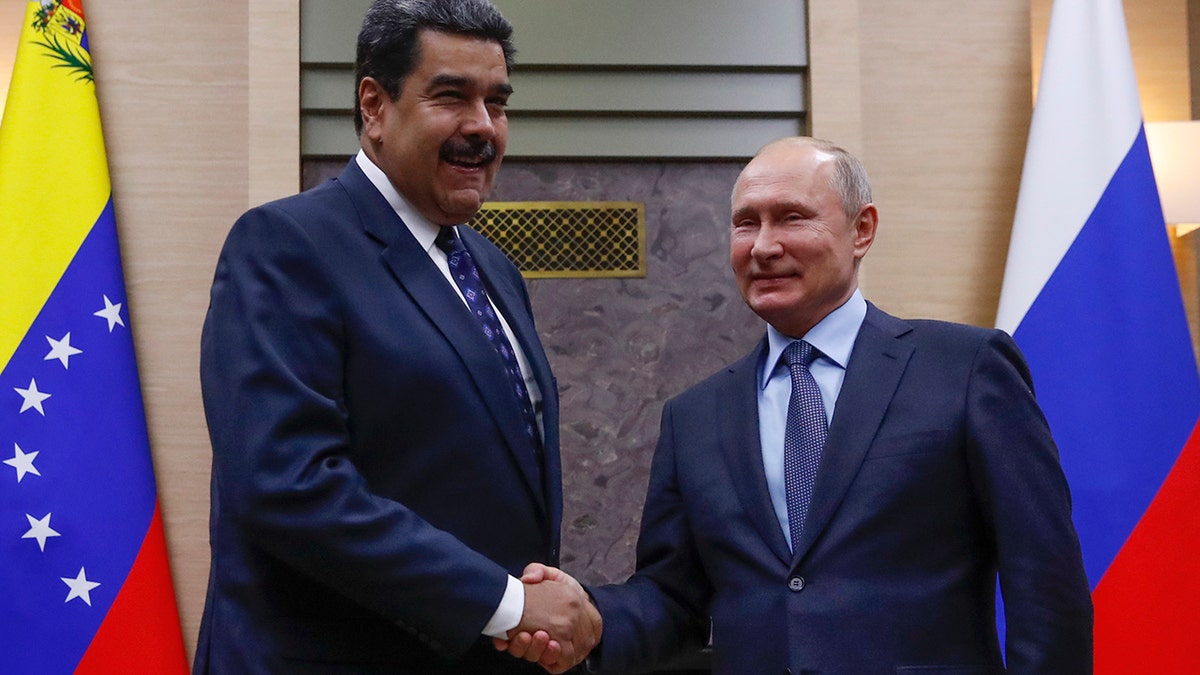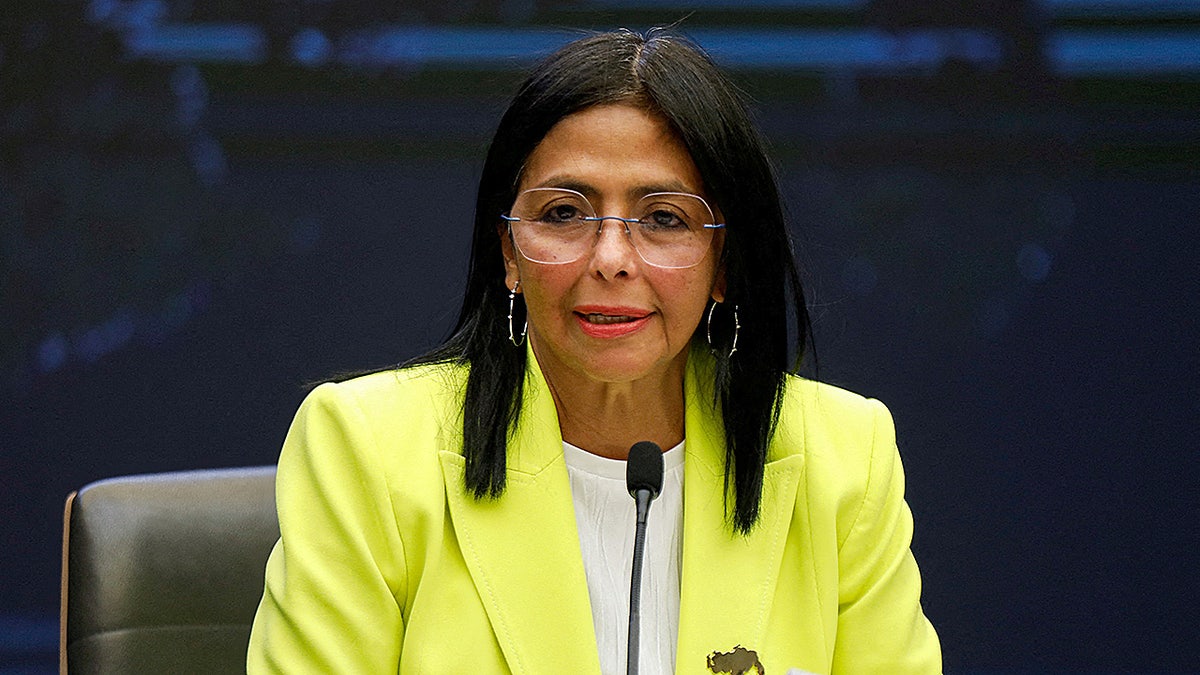INTERNACIONAL
Trump’s ‘big, beautiful bill’ heads to House-wide vote after key committee victory

President Donald Trump’s «big, beautiful bill» could be headed for a House-wide vote as soon as Wednesday night after its approval by a key committee in an 8-4 vote.
The House Rules Committee, the gatekeeper for most legislation before it gets to the full chamber, first met at 1 a.m. Wednesday to advance the massive bill in time for Speaker Mike Johnson’s Memorial Day deadline for sending it to the Senate.
The panel adjourned shortly before 11 p.m. Wednesday after all four Democrats voted against the measure and all present Republicans voted for it. Rep. Chip Roy, R-Texas, was the lone lawmaker to miss the vote.
Proceedings crept on for hours as Democrats on the committee repeatedly accursed Republicans of trying to move the bill «in the dead of night» and of trying to raise costs for working class families at the expense of the wealthy.
WHITE HOUSE URGES IMMEDIATE VOTE ON GOP’S ‘BIG, BEAUTIFUL BILL’
U.S. Speaker of the House Mike Johnson shakes hands with then-President-elect Donald Trump onstage at a House Republicans Conference meeting at the Hyatt Regency on Capitol Hill on November 13, 2024, in Washington, DC. (Andrew Harnik/Getty Images)
Democratic lawmakers also dragged out the process with dozens of amendments that stretched from early Tuesday well into Wednesday.
Republicans, meanwhile, contended the bill is aimed at boosting small businesses, farmers, and low- and middle-income families, while reducing waste, fraud, and abuse in the government safety net.
In a sign of the meeting’s high stakes, Johnson, R-La., himself visited with committee Republicans shortly before 1 a.m. and then again just after sunrise.
But the committee kicked off its meeting to advance the bill with several key outstanding issues – blue state Republicans pushing for a raise in state and local tax (SALT) deduction caps, and conservatives demanding stricter work requirement rules for Medicaid as well as a full repeal of green energy subsidies granted in former President Joe Biden’s Inflation Reduction Act (IRA).
A long-awaited amendment to the legislation aimed at fixing those issues debuted around 9 p.m. on Wednesday evening.
HOUSE FREEDOM CAUCUS HEADING TO WHITE HOUSE AFTER DELAY PLAY ON TRUMP’S ‘BIG, BEAUTIFUL BILL’

Speaker Mike Johnson must navigate his perilously slim majority to pass President Trump’s agenda (Getty Images/Fox News Digital illustration)
The amendment would speed up the implementation of Medicaid work requirements for certain able-bodied recipients from 2029 to December 2026, and award states that did not follow Obamacare-era expansion plans with more federal dollars.
It would also end a host of green energy tax subsidies by 2028 if they did not demonstrate relatively quick return on investment.
Democrats, meanwhile, accused Republicans of hastily trying to change the legislation without proper notice.
Johnson told Fox News Digital during his Wednesday 1 a.m. that he was «very close» to a deal with divided House GOP factions.
Returning from that meeting, Johnson signaled the House would press ahead with its vote either late Wednesday or early Thursday.
But the legislation’s passage through the House Rules Committee does not necessarily mean it will fare well in a House-wide vote.
A pair of House Rules Committee members, Roy and Rep. Ralph Norman, R-S.C., and were two of the conservative House Freedom Caucus members who had called for the House-wide vote to be delayed on Wednesday.

A general view of the U.S. Capitol building in Washington February 28, 2013. REUTERS/Jason Reed (REUTERS/Jason Reed)
Meanwhile, the White House bore down hard on those rebels, demanding a vote «immediately» in an official statement of policy that backed the House GOP bill.
Several of those fiscal hawks were more optimistic after a meeting at the White House with Trump and Johnson, however.
Republicans are working to pass Trump’s policies on tax, immigration, energy, defense and the national debt all in one massive bill via the budget reconciliation process.
CLICK HERE TO GET THE FOX NEWS APP
Budget reconciliation lowers the Senate’s threshold for passage from 60 votes to 51, thereby allowing the party in power to skirt the minority — in this case, Democrats — to pass sweeping pieces of legislation, provided they deal with the federal budget, taxation or the national debt.
House Republicans are hoping to advance Trump’s bill through the House and Senate by the Fourth of July.
House Of Representatives,Donald Trump,House Budget
INTERNACIONAL
Maduro-backed TdA gang’s expansion into US cities emerges as key focus of sweeping DOJ indictment

NEWYou can now listen to Fox News articles!
The U.S. military carried out a «large-scale strike» on Venezuela Saturday morning, capturing the nation’s dictatorial leader, Nicolás Maduro, who will face sweeping criminal charges on U.S. soil, according to an unsealed indictment released by Attorney General Pam Bondi.
Maduro, who was elected in 2013 and served as Hugo Chavez’s vice president, is facing charges of narco-terrorism conspiracy, cocaine importation conspiracy, possession of machine guns and destructive devices, and conspiracy to possess machine guns and destructive devices against the U.S.
«It’s just it was an amazing thing, the amazing job that these people did. There’s nobody else could have done anything like it,» Trump said of the operation.
REPUBLICANS LINE UP BEHIND TRUMP AFTER US STRIKES VENEZUELA, MADURO ARRESTED: ‘CHANGED THE COURSE OF HISTORY’
Venezuelan President Nicolás Maduro addresses supporters during a rally marking the anniversary of the 19th-century Battle of Santa Ines in Caracas, Venezuela, on Dec. 10, 2025. (Pedro Rances Mattey/Anadolu via Getty Images))
The unsealed indictment focuses on how Maduro allegedly enriched himself and «political elites» by reportedly partnering with vicious gangs and drug cartels that have established syndicates across the Western Hemisphere, including in the U.S., such as New York. The indictment lists six individuals as defendants, including Maduro, his wife, his son and Héctor Rusthenford Guerrero Flores, the leader of a vicious Venezuelan gang, Tren de Aragua.
The indictment alleges that Maduro «sits atop a corrupt, illegitimate government that, for decades, has leveraged government power to protect and promote illegal activity, including drug trafficking.»
President Donald Trump has railed against drug cartels for spreading deadly narcotics such as fentanyl in U.S. communities, leading to hundreds of thousands of overdose deaths since 2000. Trump has directed his ire at gangs such as Tren de Aragua, which Trump designated a Foreign Terrorist Organization last year.
The indictment accuses Maduro and his co-conspirators — including Venezuelan Interior Minister Diosdado Cabello and former Interior Minister Ramón Rodríguez Chacín — of partnering with narco-terrorists, including the Tren de Aragua gang and its leader, to distribute cocaine since at least 1999.
FROM BUS DRIVER TO DICTATOR: NICOLÁS MADURO’S RISE AND FALL IN VENEZUELA
«In sum, MADURO MOROS and his co-conspirators have, for decades, partnered with some of the most violent and prolific drug traffickers and narco-terrorists in the world, and relied on corrupt officials throughout the region, to distribute tons of cocaine to the United States,» the indictment states.

In this handout photo provided by the Salvadoran government, guards escort inmates allegedly linked to criminal organizations at CECOT prison on March 16, 2025 in Tecoluca, El Salvador. The Trump administration deported 238 alleged members of the Venezuelan criminal organizations ‘Tren De Aragua’ and MS-13. (Salvadoran Government via Getty Images)
The indictment alleges that Maduro «participates in, perpetuates, and protects a culture of corruption in which powerful Venezuelan elites enrich themselves through drug trafficking and the protection of their partner drug traffickers.» The indictment describes that defendants worked in coordination with cartels and gangs such as Mexico’s the Zetas, Mexico’s Sinaloa Cartel, Colombian group ELN, the Revolutionary Armed Forces of Colombia—People’s Army, and Tren de Aragua.
«TdA has expanded its criminal network throughout the Western Hemisphere and established a presence in the United States, including New York,» the indictment said. «TdA’s criminal activities include human smuggling and other illicit acts. TdA has developed additional revenue sources through a range of other criminal activities, including drug trafficking, firearms trafficking, commercial sex trafficking, kidnapping, robbery, theft, fraud, and extortion. TdA members also commit murder, assault, and other acts of violence to enforce and further the organization’s criminal activities.»
MADURO SAYS VENEZUELA IS ‘READY’ TO MAKE DEAL WITH US ON DRUGS AND OIL AFTER MILITARY STRIKES
Trump has repeatedly accused Maduro of working with cartels, while underscoring how the foreign gangs have infiltrated the U.S. and spread violence and addiction.

President Donald Trump speaks to a gathering of top U.S. military commanders at Marine Corps Base Quantico, Tuesday, Sept. 30, 2025, in Quantico, Va. (Evan Vucci/AP Photo)
«TdA operates in conjunction with Cártel de los Soles, the Nicolás Maduro regime-sponsored, narco-terrorism enterprise based in Venezuela, and commits brutal crimes, including murders, kidnappings, extortions, and human, drug, and weapons trafficking,» Trump wrote in a March 2025 presidential proclamation.
He doubled down in his press conference on Saturday, warning that «all political and military figures in Venezuela should understand what happened to Maduro can happen to them.»
Venezuela has argued that Tren de Aragua is no longer an active cartel and was effectively wiped out in 2023, Reuters previously reported.
Maduro and 14 other current and former Venezuelan officials were previously charged by U.S. federal prosecutors in 2020 on narco-terrorism, corruption and drug trafficking allegations. The January 2025 indictment expands on the 2020 document, including adding Maduro’s son and wife as defendants.
The Venezuelan government said in a statement following the Saturday strike that «the civilian and military localities of the city of Caracas, capital of the Republic, and the states of Miranda, Aragua and La Guaira» were impacted by the attack.
The nation accused the U.S. of committing a «very serious military aggression» against Venezuela and carrying out «imperialist aggression.»
«The objective of this attack is none other than to seize Venezuela’s strategic resources, particularly its oil and minerals, attempting to break the Nation’s political independence by force,» the Government of Venezuela said in a statement. «They will not succeed. After more than two hundred years of independence, the people and their legitimate Government remain steadfast in defense of sovereignty and the inalienable right to decide their own destiny.»

Pictured are allegedly 17 members of Venezuela’s Tren de Aragua gang and members of the MS-13 gang, who were deported to El Salvador. (El Salvador Press Presidency Office/Anadolu via Getty Images)
Trump said on Fox News that Maduro and his wife were flown by helicopter to a U.S. military ship. The couple will be transported to New York City, where the dictator is expected to stand trial.
«Yes, the Iwo Jima,» Trump said on Saturday morning on Fox News. «They’ll be heading into New York. The helicopters took them out, and they went by helicopter on a nice flight. I’m sure they loved it, but they’ve killed a lot of people.»
The president said he watched the operation from Mar-a-Lago, where he spent the Christmas holiday, and praised the military for its efforts.
Democrats have taken issue with a lack of notice to Congress over the strike, while MAGA Republicans have rallied around Trump’s decision.
Trump held a press conference from Mar-a-Lago on Saturday, where he said the U.S. will «run» Venezuela until there is a safe transition of power.
«We’re going to run the country until such time as we can do a safe, proper and judicious transition. So we don’t want to be involved with having somebody else get in. And we have the same situation that we had for the last long period of years. So we are going to run the country until such time as we can do a safe, proper and judicious transition. And it has to be judicious because that’s what we’re all about. We want peace, liberty and justice for the great people of Venezuela,» he said.
HERE’S WHERE TRUMP LAUNCHED AIRSTRIKES AROUND THE WORLD IN 2025: ‘PROTECT THE HOMELAND’
The capture and strike follows the U.S. military carrying out dozens of strikes on suspected narco-boats since September. Trump campaigned in-part on ending the flow of deadly narcotics such as fentanyl from other nations – which has lead to surges in overdose deaths across the last two decades – including leveling tariffs on China to curb the flow of such drugs and strengthening the U.S. borders.

Democrat lawmakers are increasingly turning up the heat on the Trump administration over its series of military strikes on suspected foreign drug-trafficking boats in the Caribbean. (@realDonaldTrump via Truth Social)
Democrats have slammed the Trump administration over its strikes on the suspected narco-boats, with Trump defending that the U.S. is engaged in an «armed conflict» with drug cartels after the groups evolved into transnational terror organizations. Officials previously argued the strikes were necessary to curb the flow of opioid deaths in the U.S., while experts said the pressure campaign on Venezuela is likely aimed to also oust Maduro as leader of the oil-rich nation.
«We’ve knocked out 97% of the drugs coming in by sea … each boat kills 25, on average, 25,000 people. We knocked out 97%. And those drugs mostly come from a place called Venezuela,» Trump said on Saturday of the boat strikes.
US MILITARY DESTROYS NARCO-TERROR CONVOY OF THREE VESSELS AT SEA IN KINETIC STRIKES

Russian President Vladimir Putin shakes hands with his Venezuelan counterpart, Nicolas Maduro. (Maxim Shemetov/AFP/Getty Images))
Foreign adversaries condemned the U.S. over the strike, including the Chinese Foreign Ministry, which reported Saturday that the country is «deeply shocked and strongly condemns the use of force by the U.S. against a sovereign country and the use of force against the president of a country.»
Russia, which is a crucial ally to Venezuela, also condemned the strike and capture in public statements.
«This morning, the United States committed an act of armed aggression against Venezuela. This is deeply concerning and condemnable,» the Russia Foreign Ministry said in a statement on Saturday. «The pretexts used to justify such actions are unfounded. Ideological animosity has prevailed over business pragmatism and the willingness to build relationships based on trust and predictability.»
Bondi warned on X that Maduro and his wife «will soon face the full wrath of American justice on American soil in American courts.»
CLICK HERE TO DOWNLOAD THE FOX NEWS APP
«On behalf of the entire U.S. DOJ, I would like to thank President Trump for having the courage to demand accountability on behalf of the American People, and a huge thank you to our brave military who conducted the incredible and highly successful mission to capture these two alleged international narco traffickers,» Bondi wrote.
Fox News Digital’s Michael Sinkewicz contributed to this report.
donald trump,military,south america,world
INTERNACIONAL
Maduro’s presumed successor, Venezuelan Vice President Delcy Rodriguez, is possibly in Russia: report

NEWYou can now listen to Fox News articles!
The presumed successor to Venezuelan President Nicolás Maduro is currently in Russia, a report said Saturday.
Four sources familiar with the movements of Venezuelan Vice President Delcy Rodriguez confirmed her location to Reuters, although the news agency cited Russia’s foreign ministry as claiming the report was «fake.»
Earlier in the day, Rodriguez demanded in audio played on Venezuelan state TV that the U.S. provide «proof of life» for Maduro and his wife after President Donald Trump said the pair were captured in a U.S. military operation.
«We demand that President Donald Trump’s government provide immediate proof of life for President Maduro and the First Lady,» Rodriguez said, according to Reuters.
LIVE UPDATES: VENEZUELA’S MADURO IS CAPTURED BY THE US
Venezuela’s President Nicolás Maduro is seen flanked by his wife Cilia Flores, right, and Delcy Rodriguez, left, in Caracas, Venezuela May 24, 2018. (Marco Bello/Reuters)
Trump later shared to Truth Social a photo of Maduro seen detained, blindfolded and clutching a water bottle while wearing gray sweatpants and a sweatshirt aboard the U.S.S. Iwo Jima. Trump said he would later be brought to New York.
Maduro previously served as Venezuela’s vice president before he took power in 2013 following the death of then-leader Hugo Chávez.
Jorge Rodriguez, who is Delcy’s brother and is the head of Venezuela’s national assembly, remains in Caracas, three sources told Reuters.
When asked about what the future of Venezuela holds with Maduro no longer in the country, Trump said in an interview on «Fox & Friends Weekend» that, «we’re making that decision now.»
REPUBLICANS LINE UP BEHIND TRUMP AFTER US STRIKES VENEZUELA, MADURO ARRESTED: ‘CHANGED THE COURSE OF HISTORY’

President Donald Trump shared a photo of captured Venezuelan President Nicolás Maduro aboard the USS Iwo Jima after strikes on Venezuela, on Saturday, Jan. 3, 2026. (Truth Social/ @realDonaldTrump)
«We can’t take a chance of letting somebody else run and just take over where he left off. So we’re making that decision now,» Trump told Fox News. «We’ll be involved in it very much, and we want to do liberty for the people. We want to, you know, have a great relationship. I think the people of Venezuela are very, very happy because they love the United States. You know, they were run by essentially a dictatorship or worse.»
Trump later confirmed at a press conference in Mar-a-Lago in Palm Beach, Fla., that the U.S. would run Venezuela on a temporary basis.
The successors to Maduro are likely to be the 2025 Nobel Peace Prize winner and opposition leaders María Corina Machado and Edmundo González, an expert said Saturday.

Venezuela’s Vice President Delcy Rodriguez addresses the media in Caracas, Venezuela, on March 10, 2025. (Leonardo Fernandez Viloria/Reuters)
CLICK HERE TO GET THE FOX NEWS APP
Jorge Jraissati, a Venezuelan who is the president of the Economic Inclusion Group, told Fox News Digital that «Machado and Gonzalez would assume a transitional government in Venezuela.
Fox News’ Rachel Wolf, Benjamin Weinthal and Efrat Lachter contributed to this report.
venezuelan political crisis,russia,military,donald trump,foreign policy,world
INTERNACIONAL
Cómo reflejan los medios del mundo el operativo de EEUU en Venezuela y la caída de Maduro

El planeta entero está hablando del operativo de Estados Unidos en territorio venezolano para extraer a Nicolás Maduro del país que gobernó los últimos 12 años.
Los medios más importantes del mundo, como los estadounidenses The New York Times y The Washington Post, los británicos The Times y The Guardian, El País de España, Le Monde de Francia o Japan Times, entre muchos otros, reflejan minuto a minuto la situación del país sudamericano.
“EEUU. captura a Maduro, dice Trump. Líder venezolano fue expulsado del país tras ataque a gran escala”, dice la portada del The New York Times, el diario más importante del planeta, que además acompañó con otras notas críticas.

En una Opinión del Comité Editorial titulada “El ataque de Trump a Venezuela es ilegal e imprudente”, el medio estadounidense asegura que si bien “pocas personas sentirán simpatía por Maduro” ya que es “antidemocrático y represivo” intentar derrocar “incluso al régimen más deplorable puede empeorar las cosas” y destacó que “Trump aún no ha ofrecido una explicación coherente de sus acciones en Venezuela”.
Su principal competidor, el prestigioso The Washington Post lleva en su título principal de portada la leyenda “Maduro capturado será llevado a Nueva York, dice Trump” y completa la información con una bajada que dice que “Estados Unidos lanzó un ‘ataque a gran escala’ contra Venezuela”.
“Trump dice que Estados Unidos estará ‘fuertemente involucrado’ en la industria petrolera de Venezuela tras ataque a Caracas y captura de Maduro”, eligió titular el británico The Guardian tras las primeras declaraciones de Donald Trump desde Mar-a-Lago.

Julián Borger, corresponsal senior del medio inglés en Venezuela, escribió que “la ‘putinización’ de la política exterior estadounidense ha llegado” al país sudamericano y asegura que “Trump ya no está doblando las reglas: las está demoliendo, con consecuencias mucho más allá de Caracas”.
“El ataque a Venezuela (que inicialmente fue planeado para el día de Navidad, según un informe estadounidense) sugiere que el atractivo de las tierras extranjeras, el petróleo y los minerales ahora brilla más que el premio Nobel”, escribió el periodista.
El tradicional diario francés Le Monde eligió para su portada el título: “Tras el secuestro de Nicolás Maduro en Venezuela, Donald Trump afirma que ‘controlará el país hasta una transición segura’” y, en una nota secundaria, el medio enumera “las principales intervenciones de Washington en América Latina desde la Guerra Fría”.

En España, El País de Madrid encabeza con el título “Trump comparece tras el ataque de EEUU a Venezuela y la captura de Maduro” y destaca lo que dijo la opositora María Corina Machado, además de que “Maduro será juzgado en Nueva York por corrupción y terrorismo”.
El diario alemán Der Spiegel remarca que el “éxito” de la operación militar estadounidense y publica que “Venezuela posee un sistema de defensa aérea relativamente moderno; sin embargo, la operación estadounidense en Caracas, presuntamente llevada a cabo por fuerzas especiales de la “Fuerza Delta”, tuvo éxito».
La Reppublica, uno de los diarios más importantes de Italia, corrigió la foto falsa que había publicado inicialmente que ubicaba a Maduro vestido de blanco en un avión junto a marines estadounidenses. Lo hizo luego de que Trump difundiera una imagen real del venezolano esposado y vestido con una campera de algodón gris, y las orejas y los ojos cubiertos. “Incursión estadounidense en Venezuela. Maduro y su esposa fueron capturados en un barco rumbo a Nueva York. Trump: ‘Están acusados de narcoterrorismo. Gobernaremos el país hasta la transición’, titula en su portada.

Corriere della Sera, el otro diario importante de Italia a nivel nacional, compuso su portada con un título de múltiple información: “Ataque de EE. UU. en Venezuela. Trump publica foto de Maduro tras su captura: ‘Hemos usado una fuerza nunca vista desde la Segunda Guerra Mundial. Gobernaremos hasta la transición’. Machado: ‘La hora de la libertad’”.
El brasileño Folha de Sao Paulo replicó en primera plana la foto de Maduro capturado y tituló con un textual de Donald Trump: “Vamos a gobernar Venezuela hasta que haya una transición”.
En un análisis editorial asegura que la “acción militar americana contra Venezuela es un crimen de agresión” y remarca que el “ataque viola el derecho internacional”.

El diario carioca O Globo también remarca con carácter de “urgente” las declaraciones de Trump: “Dice que EEUU va a ‘permanecer en Venezuela’ hasta una ‘transición apropiada’” y acompaña la manifestación pública del presidente de Brasil, Lula Da Silva, quien “condenó los ataques a Venezuela”.
El Tiempo, de Colombia, país que limita con Venezuela igual que Brasil, destaca que Trump pudo ver en “tiempo real” la captura de Maduro y otra nota de su “Unidad investigativa” revela que “Maduro intentó refugiarse en un búnker blindado”. En tanto que El Universal, el diario más tradicional de México elige la frase de Trump “vamos a dirigir el país” para encabezar sus titulares.

 CHIMENTOS1 día ago
CHIMENTOS1 día agoNoelia Marzol subió un video con su marido y encendió la polémica: “Momento de lujuria”

 POLITICA3 días ago
POLITICA3 días agoEl mensaje de Año Nuevo de Javier Milei: “Hemos cumplido con todas nuestras promesas de campaña”

 SOCIEDAD3 días ago
SOCIEDAD3 días agoApagón masivo en el AMBA: el servicio no se restablece del todo y hay miles de usuarios que aún no tienen luz























